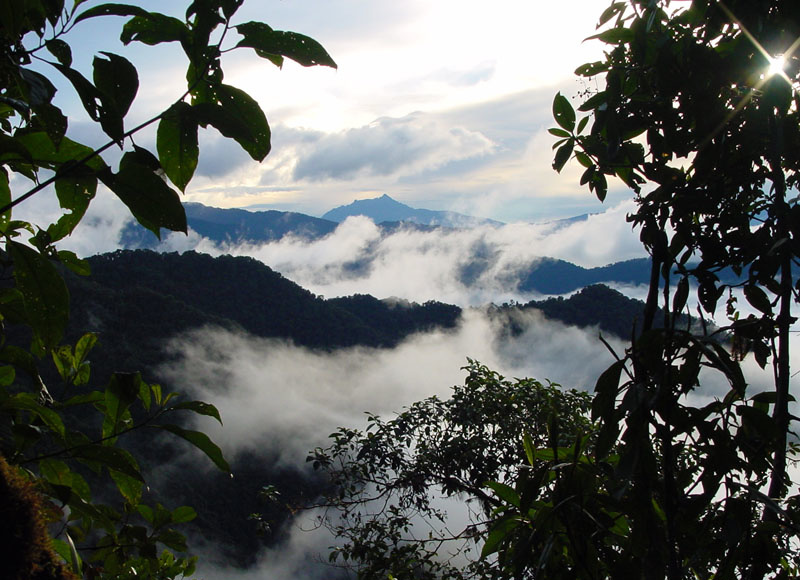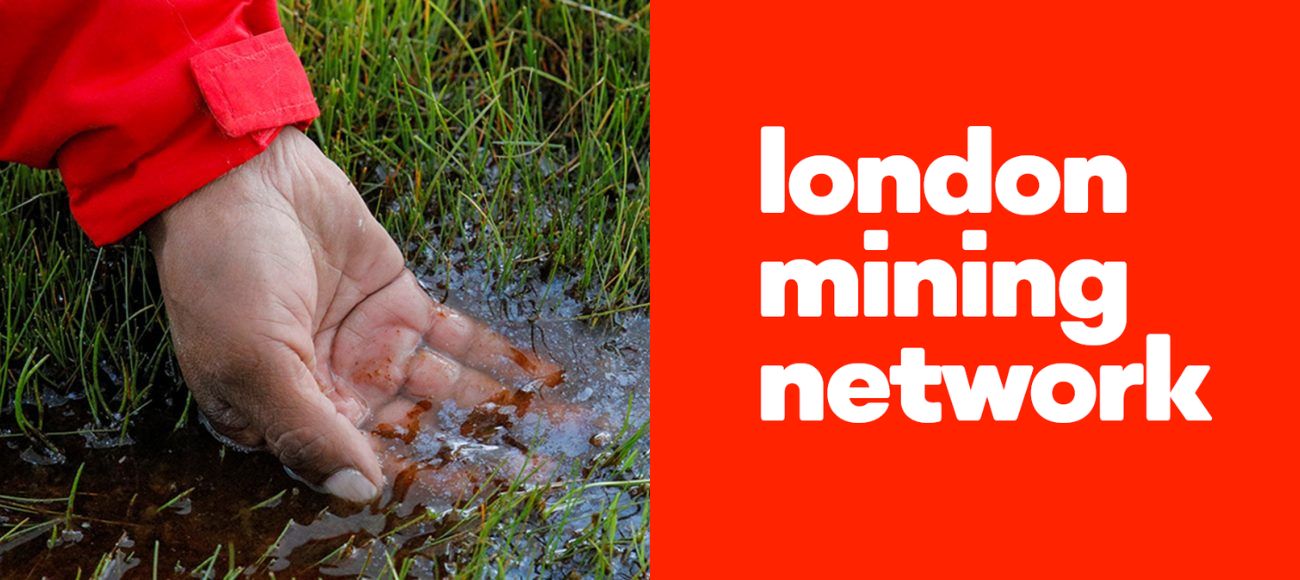This is the first post in the new London Mining Network blog, a partnership initiative between LAB and LMN. It contains a roundup of Latin America-related content from London Mining Network’s newsletter, with additional material supplied by LAB, researched and written by Tom Gatehouse
Main Stories
Ecuador: Constitutional Court to rule on fate of Los Cedros forest
In an open letter published in August, more than 1,200 scientists from all over the world urged the Ecuadorian government to cease all mining activity in Los Cedros, a protected forest in the northwest of the country just 60 kilometres from Quito. The letter – whose signatories included the primatologist Jane Goodall and the evolutionary biologists Peter and Rosemary Grant – warned of the danger mining poses both to Ecuador’s exceptional biodiversity and to the global climate.
Los Cedros, which is largely cloud forest, is home to 207 species under threat of extinction. These include the critically endangered brown-headed spider monkey, one of the rarest primates in the world, with only around 250 individuals thought to survive. It is also home to the spectacled bear, the only surviving species of bear native to South America, as well as species of orchids which are found nowhere else on Earth. New species of flora and fauna are discovered in the forest every year.
The future of Los Cedros has been in doubt since March 2017, when the Ecuadorian government awarded two mining concessions corresponding to 68% of the forest to ENAMI, the state-owned mining company. Four months later, ENAMI and its partner, the Canadian mining company Cornerstone S.A., began exploration work for copper and gold.
Hollow victory for Cotacachi
But in 2018 the autonomous government of Cotacachi filed a case against ENAMI and the Ministry of the Environment, with help from local communities and forest authorities. Last year, a provincial court ruled in their favour, concluding that the communities in the area – mostly mestizo and Afro-Ecuadorian – had not been consulted. But while the companies had their license to operate revoked, they have continued with exploration work regardless.
The ruling was also not as stringent as it should have been, as the court did not recognise Los Cedros as a protected area, a legal ambiguity which has worked in favour of the companies. With the support of the government, they have lodged an appeal against the ruling, with the dispute now being taken up by Ecuador’s Constitutional Court.
This is significant given that in 2008, Ecuador took the unprecedented step of enshrining the rights of nature in its national Constitution. Based on the indigenous Kichwa concept of sumak kawsay (buen vivir in Spanish), the aim was to promote a form of development guided by respect for the environment, in which human beings are in harmony with both their social and environmental surroundings.
Now, local communities and environmentalists hope to see this constitutional provision applied, in order to protect Los Cedros from mining and safeguard the future of similar protected areas in the country.
Sadly, Ecuador’s record on the rights of nature since 2008 leaves much to be desired. The UN, Human Rights Watch and Amnesty International have all criticised the Ecuadorian state for criminalising indigenous and environmental activists, with sweeping counterterrorism legislation being used to prosecute those who have mobilised to defend ecosystems against the expansion of extractive industries such as mining, oil drilling and hydroelectricity generation.
Rights of nature just dead letter?
One case of ominous significance for Los Cedros is that of the Yasuní national park in the far east of the country. One of the most biodiverse places on Earth, Yasuní is a UN biosphere reserve home to the Tagaeri and Taromenane people, Ecuador’s last two uncontacted tribes.
Yet in 2016, oil drillers moved into in the park, following the failure of a scheme of the then president Rafael Correa, which aimed to secure compensation from the international community in return for leaving the oil beneath Yasuní untouched. When only a fraction of the sum Ecuador had requested materialised, Correa authorised the drilling, claiming he had been left with no choice and that the profits were needed for poverty relief.
The Constitutional Court’s ruling on Los Cedros promises to set a legal precedent that will have resonance far beyond Ecuador’s borders. For Edgar Merlo, head of the legal team for Los Cedros, ‘The final judgment by the Constitutional Court in this case could change the legal focus in Ecuador, South America, and the entire world on the Rights of Nature and the rights of local communities, so that mining concessions are not granted in Protected Forests.’
However, if the Court gives the go ahead for mining in Los Cedros, it will provide further evidence that the rights of nature clause in the Constitution is little more than dead letter and signal to the world that in reality, Ecuador’s protected areas are no such thing.
Brazil: Vale and BHP continue to dodge liability for 2015 Mariana dam failure
Vale and BHP, the two companies responsible for Brazil’s worst-ever environmental disaster, are still trying to dodge their liabilities, nearly five years on from the catastrophe.
Nineteen people were killed in November 2015 when a tailings dam burst at an iron ore operation near Mariana in Minas Gerais run by Samarco, a joint venture between Vale and BHP. Forty-five million cubic metres of toxic mine tailings flowed into the nearby River Doce and eventually reached the Atlantic Ocean nearly 600 km away, with ruinous impacts on the communities living in the river basin.
But writing for the Observatório de Mineração, the Brazilian journalist Maurício Angelo has revealed that Vale and BHP are under investigation by prosecutors in Minas Gerais for alleged fiscal manoeuvres aimed at saving them billions of reais they had promised to pay in compensation following the dam collapse.
Passing the bill to the taxpayer
The alleged fiscal manoeuvres are threefold. Firstly, Samarco’s 2019 financial report shows that it is treating expenses deriving from the dam failure as tax deductible; in other words, Samarco and its parent companies may have been attempting to pass some of their liabilities for the disaster onto the Brazilian taxpayer. Brazilian law allows for the deduction of expenses which are essential to maintaining a company’s productive activity, but not for spending relating to past events.
The second manoeuvre concerns the Renova Foundation, which was set up in the wake of the disaster following negotiations between the three companies and the Brazilian State. The nominal aim was to oversee the environmental reparation of the River Doce basin and provide compensation for the victims of the disaster.
Samarco now stands accused of registering monies paid by Vale and BHP to Renova as debt to its parent companies, transforming what should have been donations towards the environmental recovery and compensation for the victims into loans with interest. Samarco is currently prohibited from paying dividends to its parent companies, but this scheme could be saving Vale and BHP more than R$1.5 billion (nearly £207m).
Thirdly, Samarco has been issuing debentures – a type of bond or debt security – to Vale and BHP for loans it has received from them. Not only does this generate credit for Vale and BHP, Samarco is paying interest on these loans, which may also violate the prohibition on Samarco paying dividends to its parent companies. Moreover, the payment of interest on these debentures reduces Samarco’s tax obligations – which once again, looks like an attempt to pass the bill on to the Brazilian State.
Cutting support in a global pandemic
Then in July this year – with the Covid-19 pandemic ravaging Brazil – Renova suspended payments to at least 7000 victims of the dam failure in the River Doce basin, claiming that conditions had been re-established for them to resume their previous economic activities. Those affected were mostly small-scale fishermen and traders whose livelihoods had been devastated by the disaster.
But denouncing what they called ‘possibly a mass human rights violation’, public defenders – both for the states of Minas Gerais and Espírito Santo as well as at federal level – moved swiftly to block the suspension. These prosecutors argued that the decision had been taken unilaterally and without any warning, in contravention of all the agreements Renova had signed on the matter. A federal court agreed and ordered Renova to reinstate the payments.
Brazilians still seeking justice in the UK
Finally, BHP has dismissed as ‘pointless and wasteful’ a case brought in the UK by 200,000 Brazilian people and groups. It has called for the case to be dismissed or suspended, arguing that it reproduces existing legal proceedings in Brazil and that the victims are already being compensated via the Renova Foundation.
For their part, the claimants argue that as a London-listed company, BHP can be pursued in the UK courts for crimes committed by its foreign divisions. They also argue that they are unlikely to receive full redress for their losses in Brazil anytime soon, citing the ongoing problems that those affected by the disaster have faced when trying to obtain adequate compensation from Renova.
Since November 2015, the actions of Renova, Samarco, Vale and BHP have betrayed a clear objective: to reduce, using whatever means necessary, the liability of Samarco and its parent companies for the dam failure and its consequences. The news of these latest evasions and subterfuges should therefore come as no surprise.
In other news…
Water rights under scrutiny in Chile’s Atacama Desert
Mining companies sifting northern Chile’s Atacama Desert for copper, lithium, and other minerals are increasingly finding water is their most precious resource. But their ability to exercise water rights is being challenged by environmentalists, farmers and the authorities who say the huge expansion of mining activity and climate change have shrunk water supplies.
BHP broadens plans to exit coal operations
The world’s biggest miner is accelerating the sale or spinoff of interests in mines in Australia and Colombia, and is planning to shed two coking coal operations and a share in an Exxon Mobil-controlled oil and gas business.
Union on Strike Refusing ‘Death Shift’ at Latin America’s Largest Coal Mine
Sintracarbón, the mineworkers’ union at the Cerrejón coalmine in Colombia, is resisting company attempts to reduce the workforce by 25%, impose potentially dangerous new shift patterns and reduce or abolish several employee benefits.
Colombia: legal intervention to protect Arroyo Bruno
Colombian Caravana and ABColombia, with the help of LMN and member group Colombia Solidarity Campaign, have filed an Amicus Curiae before a Colombian Court to assist in the enforcement of a Constitutional Court ruling.
Protests against Anglo American in Brazil
Members of communities affected by Anglo American’s Minas Rio iron ore operations in the state of Minas Gerais, Brazil, blocked roads in protest against the company’s withdrawal of funding for independent technical advice.
Glencore under fire from Yukpa indigenous people in Cesar, Colombia
The Yukpa, an indigenous group native to Colombia and Venezuela, are demanding that the Colombian Attorney General, Francisco Barbosa, along with the Director of the Environmental Prosecutor’s Office, visit sites where mining companies Glencore and Drummond have diverted rivers.
Global Industry Standards of Tailings Management: Not Enough to Prevent Disaster
On 5 August 2020, the Global Tailings Review launched its new Global Industry Standards of Tailings Management (GISTM). These standards are aimed at preventing tailings disasters such as the Bento Rodrigues dam failure of November 2015 (see above) and the Brumadinho collapse of January 2019, but in our eyes and those of many of our friends and allies, they do not do enough to protect mining-affected communities.


